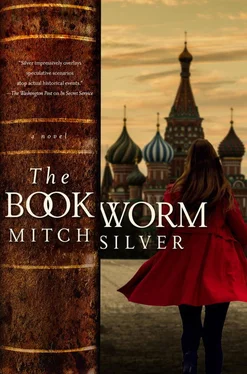From the restaurant Lara took the Metro, intending to cross over to the Number Seven line and home. But then she thought she would get off at Revolution Square and look for something to wear in the designer room upstairs at TsUM. Did she have enough to cover it? Lara thumbed through her checkbook. No, not for anything nice. All right, maybe she could borrow something from Vera. Her friend was the original clotheshorse, and on a teacher’s salary too.
Lara was still plotting her fashion moves when her brain picked up on the fact that it wasn’t the disembodied inbound male voice of the Metro system but the outbound female announcing the next station. She’d missed her stop and was instead, like some kind of mixed-up homing pigeon, heading out to the Arkhiv, where she’d spent the entire summer.
By the time the woman announced they were approaching Vodny Stadion, or “Water Station”—named for the old pumping facility that once supplied drinking water from the Moskva River—Lara decided that fate or kismet or who-knows-what wished her to listen to the Dictaphone recordings in the shopping bag on the Osobyi ’s ancient machines. She’d have to call Vera that evening. Lara got out and mounted the Metro steps, amazed to be back at the place she thought she’d left behind for the year.
There are truckloads—make that trainloads—of German World War II documents stored all over Moscow. Hundreds of trainloads. Through a bit of geographical luck it was the eastern half of Berlin, the half of the city Russian troops occupied in 1945, where most of the important Nazi government offices were located, like the Reichskanzlei and, of course, the underground Führerbunker. Government offices, naturally, meant government files. After the war, East Berlin eventually became part of the German Democratic Republic, and the city’s Communist puppets were only too happy to ship anything of value or interest back to Big Brother in the Soviet Union.
For decades, the most secret Nazi papers, the so-called “ Osobyi ” files, were kept under lock and key in the middle of town near the Kremlin. Then, in the last days of Gorbachev, when everything was breaking down, they were opened up to Russian scholars like Lara. Under Yeltsin, even more of the boxes, the monthly yashchiks , were brought out into the light. Lara could walk over from the flat, flash her plastic ID card on its chain, and immerse herself in the Third Reich.
Putin put an end to all that. The ex-KGB man ordered the Osobyi section moved to the Russian State Military Archives out past the airport. A twenty-minute drive along the outer ring road when Lara had the car, it was nearly an hour on the Metro from the University, requiring a change in the middle of town.
The clock over the entrance said it was after 3:00 when Lara swiped her ID through the updated card reader. Two hours was all she had before the place shut up tight. She nodded, as usual, to Leonid, the guard, and opened the shopping bag to show him the tins. Without a word he affixed six white stickers on the six cans to indicate she’d brought them in with her.
Lara hurried toward the double glass doors of the Listening Room. Finding it unoccupied, she parked her things against the far wall before seating herself at one of the three 1940s-era Dictaphone machines.
Okay, in for a penny, in for a pound: If the long-dead Englishman Noël Coward knew something that could blow a hole through her life’s work, she wanted to hear about it before someone else trumpeted the fact.
On top of the tins inside the shopping bag was the cardboard shipping tag she’d seen before. Lara could make out the words, preprinted in English: OFFICIAL MAIL OF THE MILITARY COURT OF THE UNITED KINGDOM. DO NOT OPEN. Underneath, in smaller type, it said, “The contents of this bag are vouchsafed proof from inspection by order of His Majesty, Directive 31.2.”
“His” Majesty. Interesting. She took the tin marked “Number One” from the shopping bag and, breaking the seal, allowed the wax cylinder inside, as pristine as the day it was recorded, to slide out. Lining up the machine’s lever with a guide on the side, she dropped the recording in and pushed the lever back. Because the original hand-held listening tubes were tiring to use over long periods, they had been modified to accept modern over-the-ear headphones. So, with her iPad powered up and ready to take notes, she lifted one of the Bose QC15s from the shelf above the machines, plugged it into the old contraption and settled down to listen. It was a man’s voice that began:
Now that I’ve figured out how to work this infernal device, I suppose I should start by saying this is Dictaphone cylinder number one. Fair warning, Robert, old friend—oh, sorry, it’s Sir Robert now, isn’t it? Well then, Sir Robert, your man has given me a half-dozen of these thingies, and I intend to fill them up over the next six evenings.
Lara typed “Sir Robert?” on her computer pad. Over the next two hours, she would make dozens of entries.
For the record, my name is Noël Peirce Coward and I was born in Teddington, Middlesex, as a Christmas present to my parents in 1899. The date today is the second of October 1944, which makes me not quite forty-five, still in the full flower of manhood. I don’t know how you swung it, Robert, tracking me down in the city of palms and swimming pools from five thousand miles away for something as inconsequential as a war. But here I am in a little soundproofed room off La Cienega Boulevard—which, I’ll have you know, in Spanish means The Cienega Boulevard—“thoroughly documenting” an incident from the early days.
“Tattling” is more like it, and during the cocktail hour, too, after slaving all day over a hot movie studio, trying to pry a few dollars for my next production out of some tight American fists. Still, if it will help poor Anthony…
So, I have consented to do as you ask and prattle into this microphone whilst your earnest assistant on the other side of the glass takes notes, disgorging everything I know about the matter for you and your colleagues to use in his defense before the Court of Inquiry.
It’s quite a lot, actually. And I’m going to tell every scrap of it, because Anthony may be a lot of things, but of one thing I’m certain: he’s no enemy of his country. The government perhaps, but never the country… of that I’m sure.
Then too, given the Military Secrets Act, this will be the one and only time the story will be told, so I intend to do it justice. No editing myself, no euphemisms for the naughty bits—I’m trusting you to see to all that when you come to have this typed up. For now it’s the truth, the whole truth, and nothing left out.
It all began with Celia Johnson’s toothache. Well, to be honest, even earlier than that, four years before Celia’s tooth ever thought of becoming inflamed. In 1935, one morning out of the clear blue, Marlene Dietrich rang me up to say how much she’d liked my performance the night before in The Scoundrel . We’ve been best pals ever since, in keeping with my firm practice of fawning on every admirer.
The party for Marlene in ’39 is where Celia’s tooth comes in. Or rather, out. I had prevailed upon her and her husband, Peter Fleming, the travel writer, to motor down from Oxfordshire right before the war to take a villa in Cap Ferrat, next to where I was staying with Willie Maugham. I was thinking of her for Private Lives , and I wanted to twist her arm a bit. Sadly, she decided to take Pride & Prejudice instead. We wouldn’t actually work together for three more years, until she played my wife… imagine… in the picture, In Which We Serve.
Anyway, Peter had his younger brother Ian join us all for the fortnight, ostensibly to get in some golf but really as a sort of unpaid nursemaid for their newborn baby, Nichol. Which freed Celia and Peter to pop over to our place next door to celebrate Marlene’s U.S. citizenship, which had just come through. Are you getting all this?
Читать дальше












